Having experienced “farm-to-table” first-hand on a trip to Tasmania and noticing a gap in the Singaporean market for locally made artisanal products, a cultured butter business Atas Butter was set up six months ago.
It started as a home-based business and recently moved into its own premises to cater for increasing orders.
“We are seeing a changing customer base. People really care more about the stories and the narrative on the source of their foods. And I think they are happy to pay a premium for that experience,” Daryl Yeo, Founder of Atas Butter, told FoodNavigator-Asia.
It currently distributes its products to the Singapore market online, and via pop-up events and boutique fairs.
Flavour innovation
Yeo added that customers are drawn to savoury flavours, with Kombu butter and smoked culture butter as the top-sellers. The wide array of flavours in Asia meant that there are aplenty opportunities for flavour innovation, he says.
“The unique selling point is that we are made to order and cultured locally. We make our own spin in creating a luxury butter experience with Asian-inspired flavours, like Gula Melaka and Mala. There are so many other flavours to explore,” Yeo explained.
FoodNavigator-Asia previously published a piece about how the flavour innovation process in APAC is primarily driven by culture and localisation factors, rather than novelty and exoticism that were observed in Western markets.
Butter as a “hero ingredient”
Yeo, however, emphasised the need for control when it comes to production and distribution:
“Having control for an artisanal product is very important. My inclination is to still control the distribution. You will dilute the brand if you put it in the mass market and people will compare you with other affordable options. It will just become a different business, and you lose that artisanal quality. I want to see how far I can scale in the business,” he says.
He said its products tend to be consumed on a butter board alongside bread, or used to replace oil or butter to cook pasta and seafood to give it an extra umami.
Atas Butter hopes to highlight butter as the “hero ingredient [able to] stand on its own”, and is looking for partners to champion the brand.
“Not everyone is comfortable with that kind of thinking to highlight this ingredient [butter]. I do eventually want to find people who really understand, like chefs from Michelin restaurants, as they really like to highlight an ingredient on a specific region, that are along the lines of fresh foods.”
It currently imports its ingredients from countries including the UK and Japan, and cultures it locally. However, it ultimately hopes to be sustainable enough build a whole supply chain locally – from sourcing, producing to retailing.

